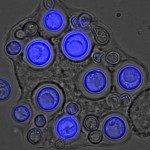Link to Pubmed [PMID] – 17262720
J. Infect. Dis. 2007 Mar;195(5):756-64
Variables influencing the risk of dissemination and outcome of Cryptococcus neoformans infection were assessed in 111 organ transplant recipients with cryptococcosis in a prospective, multicenter, international study. Sixty-one percent (68/111) of the patients had disseminated infection. The risk of disseminated cryptococcosis was significantly higher for liver transplant recipients (adjusted hazard ratio [HR], 6.65; P=.048). The overall mortality rate at 90 days was 14% (16/111). The mortality rate was higher in patients with abnormal mental status (P=.023), renal failure at baseline (P=.028), fungemia (P=.006), and disseminated infection (P=.035) and was lower in those receiving a calcineurin-inhibitor agent (P=.003). In a multivariable analysis, the receipt of a calcineurin-inhibitor agent was independently associated with a lower mortality (adjusted HR, 0.21; P=.008), and renal failure at baseline with a higher mortality rate (adjusted HR, 3.14; P=.037). Thus, outcome in transplant recipients with cryptococcosis appears to be influenced by the type of immunosuppressive agent employed. Additionally, discerning the basis for transplant type-specific differences in disease severity has implications relevant for yielding further insights into the pathogenesis of C. neoformans infection in transplant recipients.
